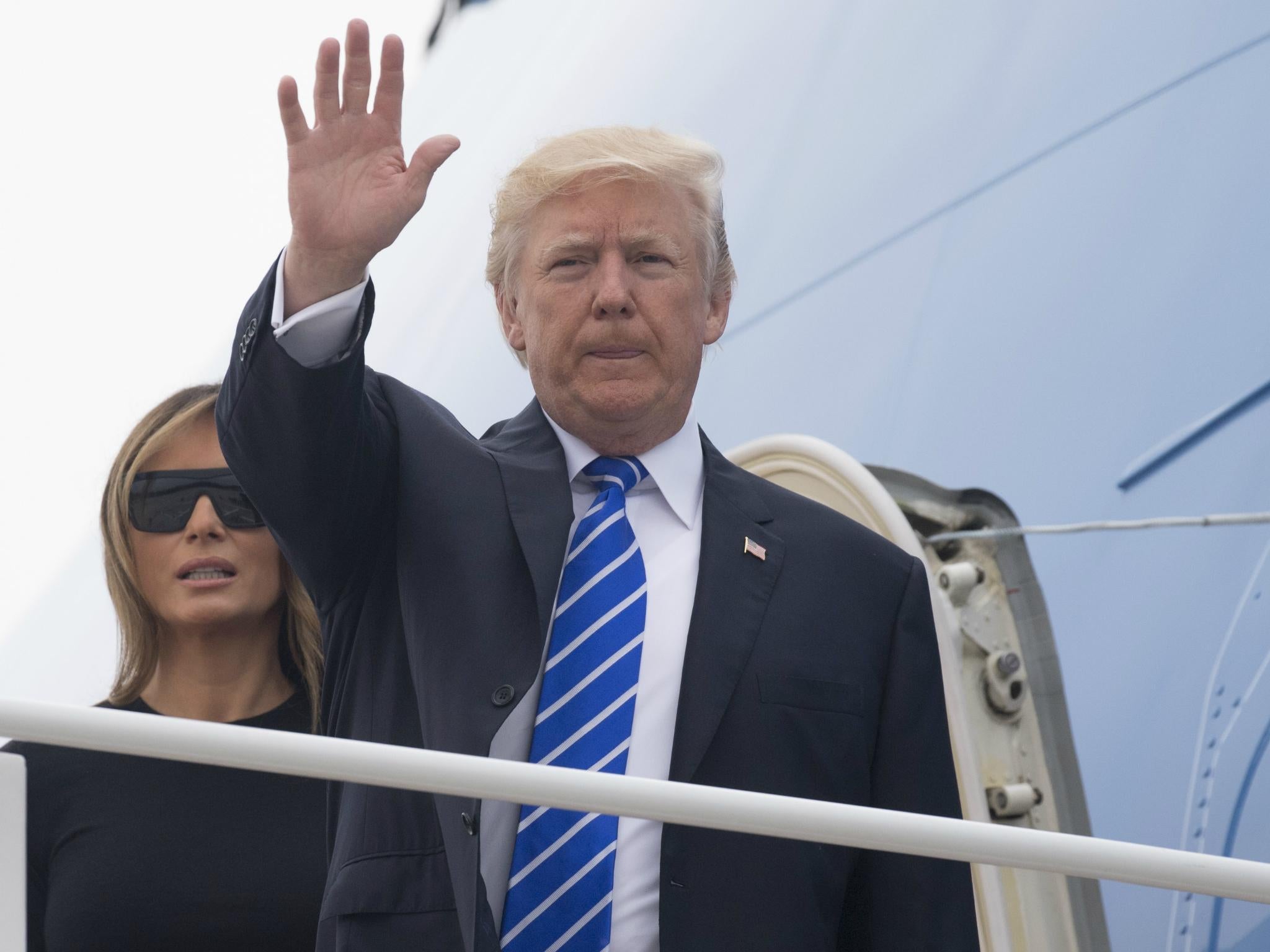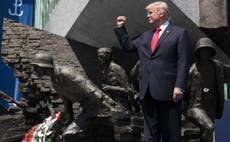Trump and Putin are about to meet for the first time – there's no guarantee that it'll go smoothly
Trump stressed during the election campaign that he would seek to improve relations with Russia, and he was right to do so. But it remains unclear how this will be pursued now that he is in the White House


When the young President John F Kennedy met Nikita Khruschev for the first time, the Russian premier quipped: “You know, we voted for you”. Vladimir Putin may feel it would be prudent not to say the same thing to Donald Trump at their first meeting, at the G20 summit, taking place in Hamburg.
The allegations of Russian interference in the US presidential election and that Trump was the “Moscovian Candidate” is one of the defining features of the new administration in Washington. The President’s National Security Adviser, Lieutenant General Michael Flynn, has already had to resign over this and other heads are likely to fall as the investigation under special counsel, Robert Mueller, gets under way.
It may seem difficult to uncouple that from the broader dealings in the international arena between American and Russia. But it is in the interest of everyone sensible that there is a good, or at least working, relationship between the world’s two superpowers.
There will obviously be massive focus on the first meeting between Trump and Putin, scheduled for Friday. After an initial unease with the Russian President at his first meeting in 2001, George W Bush declared that he had “looked the man in the eye” and “got a sense of his soul”. Tony Blair enthused after his first encounter with the Russian leader: “the Cold War is over”.
Trump has got on extremely well with “strongmen” he has met – Jinping of China, Abe of Japan, Modi of India, Netanyahu of Israel – and there is little to suggest that he would not strike up a similar rapport with the Russian President.
What happens next? Trump stressed during the election campaign that he would seek to improve relations with Russia, and he was right to do so. But it remains unclear how this will be pursued now that he is in the White House. A mark of his administration has been the often chaotic and contradictory signals it sends. The military strike on the Syrian regime, after charges of carrying out a chemical attack, caught many, including the Russians, by surprise.
There has been another declaration by the White House that President Assad was preparing another chemical attack and would “pay a heavy price” if this took place. This caught the US military and State Department somewhat by surprise: no evidence has been presented that any such attack was being planned. But the American belligerence has not been confined just to rhetoric. In just over a month the US has shot down a regime jet as well as two Iranian-supplied drones. At the same time American warplanes have bombed regime forces on no less than four occasions.
It appears that this is due to divisions and infighting which has been another characteristic of the Trump administration, with a faction in it seeing the Syrian civil war as an opportunity to take the war to Iran.
The activities of this group have alarmed senior figures in the US military including General James Mattis, the Defence Secretary, and Lt-Gen HR McMaster, the President’s National Security Adviser. Neither they nor General Joseph Dunford, chairman of the Joint Chiefs of Staff, want another front in the war against Iran and its allied Shia militias. The US mission in Syria, they have insisted, should focus on the reason it was set up – to fight Isis.
But the Iran hawks, for the time being, have the ears of the US President who has been persuaded by Sunni Saudi Arabia that Shia Iran was the great enemy. On the eve of the G20 summit, talking about Syria on a visit to Poland, Trump did not speak of Isis or Jabhat al-Nusra, whose adherents have committed atrocities in not just Syria, but the West, but of “a political solution that does not advance Iran’s destructive agenda and does not allow terrorist organisations to return”.
But the facts on the ground are that Russia is the prime player in Syria, and it is not about to sacrifice President Assad or tell the Iranians to go home. Any solution, as US Secretary of State Rex Tillerson pointed out this week, will need Moscow to play a central role. The G20 summit should be the place where an understanding for a long term plan is put in place. Whether that happens or not will be largely down to the approach taken by the Americans.
Ukraine is another highly contentious issue. It is an indication of the state of affairs in that country that as the G20 summit begins, a conference is taking place in London on Ukraine and corruption. Three years after the uprising which overthrew President Viktor Yanukovych, graft and manipulation of the law remains a running sore through the system of governance.
The latest tranche of money from the IMF, $1bn of $17.5bn, came, as in previous instalments, with the caveat that the government in Kiev “has to do more” to carry out urgent reforms. However, the international community has no choice but to keep Ukraine propped up with the country bitterly divided and its economy in a perilous state after the civil war which followed the fall of President Yanukovych.
Crimea went to Russia at the same time. Annexed, say the Ukrainians and the West, reunified says Moscow. There is little chance of Crimea, which was part of Russia until Nikita Khruschev gave it to Ukraine in 1954, returning to the Kiev government. During the US election campaign Trump indicated that he accepted the situation in Crimea as a fait accompli. This was held up by his critics as an example of his Russian collusion. But very few politicians in the West believe that Crimea will go back to Ukraine and fewer still think that Nato would ever be deployed in Ukraine to fight the Russians.
Trump also gave an interview during the election campaign in which he said he was disinclined to continue sanctions on Russia over its role in the fighting in the east of the country or Crimea. Recently, Secretary of State Tillerson asked Congress that the sanctions should not be renewed for the time being but used as a form of leverage with Moscow.
In the event, the Senate voted to renew sanctions by 97 to two. But Ukraine is fading from the international radar and the appetite for sanctions, it is expected, will fade in Washington as it will in Europe where Britain, one of the foremost proponents of the punitive measures, is likely to be mired in internal political convulsions and Brexit for the near future. As a senior State Department official commented, “Ukraine will become a historic issue sooner rather than later.”
The G20 summit takes place while another crisis unfolds – North Korea’s launch of a long-range missile and the possibility that it will be armed with a nuclear warhead in the future. Following the launch on Tuesday – which may well have been timed for the summit – there was little of the usual bombast in Trump’s tweet. There was no threat of American action against Kim Jong-Un or his regime – instead the President was seemingly leaving it to others to deal with the crisis. “…Hard to believe that South Korea and Japan will put up with this much longer. Perhaps China will put a heavy move on North Korea and end this nonsense once and for all!!”
Trump is now apparently considering “some pretty severe things” to punish North Korea for its “very, very bad behaviour”. Nikki Haley, the US ambassador to the UN who has appointed herself the administration’s attack dog, spoke of using military forces and blamed Russia and China for supposedly not doing enough to stop North Korea. But the facts of life and death were summed up by a military man, Defence Secretary James Mattis, who pointed out that “if this goes to a military solution, it is going to be tragic on an unbelievable scale. So our effort is to work with the UN, work with China, work with Japan, work with South Korea to find a way out of the situation.”
Trump will have the opportunity to speak to Putin as well as Jinping about North Korea. Both the countries have an interest in ensuring that Kim Jong-Un’s nuclear ambitions are kept under control and also to avoid a conflict, with catastrophic consequences, breaking out. There is little other real choice than for the US to talk to the Russians and Chinese among others.
There is always the possibility, of course, that Trump’s meetings with Putin will go badly. That is what happened with JFK and Khruschev. The young American President left bruised, suspicious of the Kremlin’s intentions and determined to show his toughness. The arena he chose for that showdown has become synonymous with disasters in American foreign and defence policy – Vietnam. Something Trump’s hawkish advisors who want to push an inexperienced and pliable President towards aggressively asserting American strength might may want to bear in mind.



Join our commenting forum
Join thought-provoking conversations, follow other Independent readers and see their replies
Comments